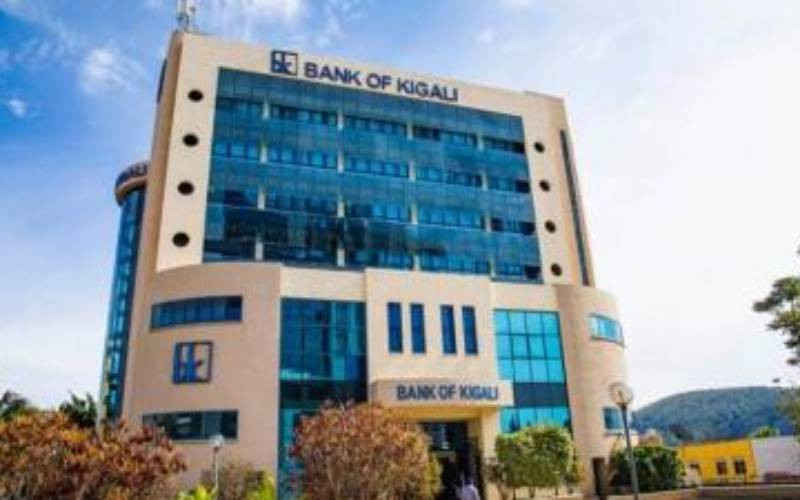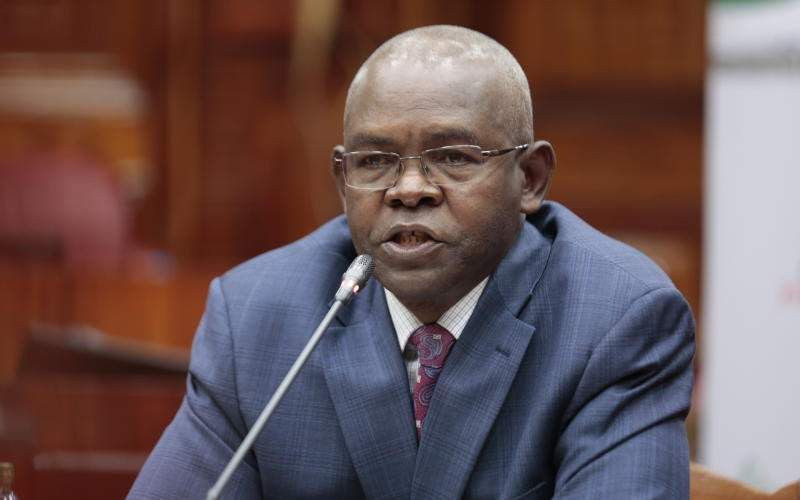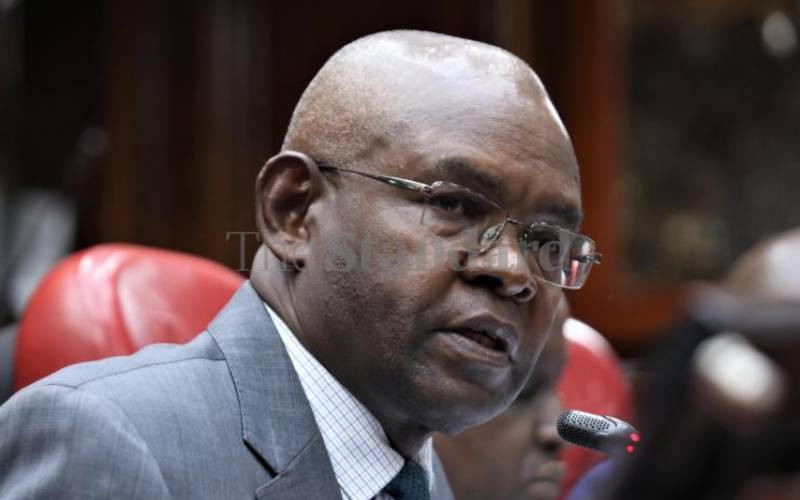 |
| CBK outgoing governor Njuguna Ndung'u |
On Tuesday, March 3 this year, Prof Njuguna Ndung’u will likely lean towards the computer in his Haile Selassie Avenue office and reminisce.
Thoughts of the relatively quiet life he led while at the University of Nairobi, the Kenya Institute for Public Policy Research and Analysis (Kippra) and the African Economic Research Consortium (AERC) will flit across his mind.
It has been years since he has had to reflect on what direction his career will take. At only 54, his life story is still in mid-stream. Will he go back to teaching advanced economic theory and econometrics at the University of Nairobi where he was associate professor of economics?
Whatever path he pursues, however, Prof Ndung’u can rely on the commendation of his approval ratings.
Lower inflation
As he leaves the Central Bank of Kenya (CBK) premises on March 4, perhaps crossing over to Nairobi’s University Way as he has insinuated in the past, bankers will applaud him.
In fact, just three months ago, he was named 2014’s Central Bank Governor of the Year in sub-Saharan Africa for his efforts to lower inflation, strengthen the shilling and improve the penetration of financial services.
This went a long way towards rubbing off the 2011 stain on his legacy when he was rated Africa’s worst governor. He got the dubious ranking in the year he was reappointed at CBK for a further four-year term, on account of presiding over the fall of the shilling to record lows of Sh107 to the dollar, and failing to stem accelerating inflation.
Former CBK Deputy Governor Nzioka Kibua told Business Beat that Ndung’u should be applauded for introducing an enduring turnaround in Kenya’s banking system.
“The gentleman did it excellently. Today, no bank is under stress and they are opening branches almost everywhere. The country has a fairly strong banking system and financial penetration has reached the remotest of regions,” he said.
And in 2007-8, when European and American banks were hit by a financial crisis that shook behemoths like Merrill Lynch, AIG, Royal Bank of Scotland and Fortis, and brought down giants like Lehman Brothers, Kenyan banks maintained an eerie calm.
“This is because Prof Ndung’u is an economist; he performed brilliantly on this front, despite the tough political challenges. His predecessors really failed on this,” Dr Kibua said.
According to the former deputy governor, Ndung’u will go down in CBK’s history as an “A” governor who managed the country’s political economy well.
“We did not hear of him being at loggerheads with the Treasury on the fiscal side, nor was there any noise coming from the CBK Board, the Monetary Policy Committee or the Kenya Bankers Association.”
Low grade
Stay informed. Subscribe to our newsletter
However, despite the high praise, on some fronts — such as inflation, interest rates and foreign exchange rates — Kibua gives Ndung’u a fairly low grade.
He said in the past eight years that Ndung’u has served as CBK boss, the cost of living has been fairly high. On this one, he said, the governor has failed.
And then there is the issue of the high cost of money, otherwise referred to as interest rates.
Savers have complained of the low returns on deposits, yet the cost of borrowing remains high. Currently, the difference between the interest rate charged by banks on loans and the interest rate paid on savings is about 16 per cent.
“This problem, though thorny and persistent, was rarely tackled, and neither was the issue of non-interest charges on customers, which border on criminal charges. That is why commercial banks are making huge profits,” said Kibua.
“Sadly, Prof Ndung’u is leaving office, having done nothing on these.”
The gripe with foreign exchange rates is similar to the issue with interest rates.
“Having been plucked straight from a university lecture hall to a high-profile job, we did not expect Prof Ndung’u to perform better than his predecessors on this assignment.
Sound management of exchange rates calls for hands-on experience,” said Samuel Nyandemo, an economics lecturer at the University of Nairobi.
Efforts to reach the governor for comment had not borne fruit by the time of going to press.
Dr Nyandemo, a fierce critic of Ndung’u’s policies, added that he feels the governor’s continued stay at CBK would have plunged the country into disaster.
“But I do not hold any grudge against the governor — academics do not hold grudges. He has been a workmate and I look forward to teaching with him again; he’s an excellent teacher.”
However, no kind words on Ndung’u’s tenure come from Boni Khalwale, the former Public Accounts Committee chairman. The Kakamega County senator told Business Beat he thinks the governor “should be in jail”.
“It is under his tenure that a lot of scandals took place at central bank. Kenyans lost billions of shillings.”
The Cockar Commission, which was appointed to investigate the sale of the Grand Regency Hotel, found that “the entire transaction was tainted with misrepresentation and deception to such an extent as to warrant specialised investigation by the Attorney General and other relevant institutions into the bona fides of the purchaser and other aspects of the transaction”.
Money-printing deal
Dr Khalwale said the report essentially nailed former Finance Minister Amos Kimunya and Ndung’u, claiming: “Prof Njuguna Ndung’u was not completely honest with other public institutions, namely the Kenya Anti-Corruption Commission, the Commissioner for Lands, the Public Procurement Oversight Authority and the Prime Minister on the sale of the hotel.”
It is the alleged flouting of procurement procedures as contained in the Public Procurement Act that saw the Public Accounts Committee declare Mr Kimunya and Ndung’u “unfit to hold public office” in 2012.
Further, the scandal where Kenyans lost more than Sh1.8 billion in a money-printing deal with De La Rue could be the biggest stain on the legacy Ndung’u has worked hard to build.
The Government is currently in discussions on who will succeed Ndung’u in five weeks’ time, with Kibua saying the probability of the current deputy governor, Haron Sirima, taking over is low, going by history.
“It has never happened in this country’s history. It may never happen in the future.”
According to Kibua, fresh blood is needed at CBK’s helm.
“There are many quacks holding PhDs, but this position does not just call for academic prowess; experience and skills in the management of institutional relationships are fundamental, especially in the case of debt management.”
[email protected]
 The Standard Group Plc is a
multi-media organization with investments in media platforms spanning newspaper
print operations, television, radio broadcasting, digital and online services. The
Standard Group is recognized as a leading multi-media house in Kenya with a key
influence in matters of national and international interest.
The Standard Group Plc is a
multi-media organization with investments in media platforms spanning newspaper
print operations, television, radio broadcasting, digital and online services. The
Standard Group is recognized as a leading multi-media house in Kenya with a key
influence in matters of national and international interest.
 The Standard Group Plc is a
multi-media organization with investments in media platforms spanning newspaper
print operations, television, radio broadcasting, digital and online services. The
Standard Group is recognized as a leading multi-media house in Kenya with a key
influence in matters of national and international interest.
The Standard Group Plc is a
multi-media organization with investments in media platforms spanning newspaper
print operations, television, radio broadcasting, digital and online services. The
Standard Group is recognized as a leading multi-media house in Kenya with a key
influence in matters of national and international interest.









